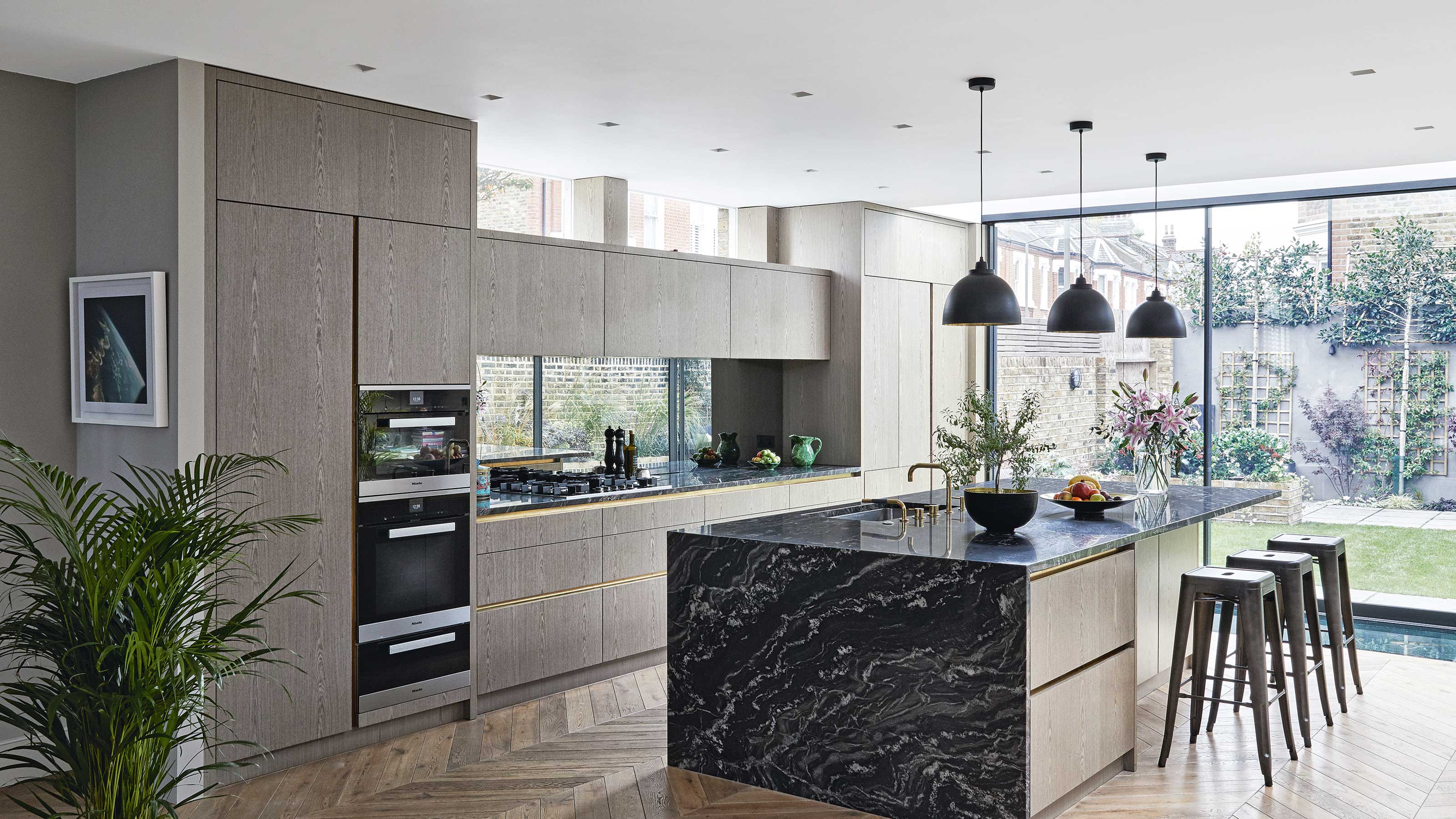
- 1. Work out what the problem areas are
- 2. Donate items you don’t use
- 3. Assess your appliances
- 4. Keep food in check
- 5. Be sensible with where you store things
- 6. Enlist organizational ‘helpers’ to maximize space
- 7. Steer clear of countertop clutter
- 8. Make use of portable storage space
- 9. Use baskets to categorize items
- 10. Avoid stockpiling
Organizing a kitchen with too much stuff can feel like a big ask, but it’s very doable and well worth the effort. As well as making for a more pleasing kitchen aesthetic, organizing – and cutting back on – your cookware collection comes with a host of other benefits. Cooking becomes easier and more enjoyable (perhaps even better), as does entertaining, while the clean down afterward is much quicker, too – bonus.
Regardless of how much ‘stuff’ you have, the first thing any expert will tell you to do before organizing a kitchen is to declutter. If yours plays host to a few more utensils and appliances than the average, a comprehensive kitchen decluttering list is a good place to start.
‘Decluttering is a process, so it's important to take your time and be patient with yourself. Start by taking everything out of your cabinets and drawers so you can see what you have and decide what to keep. Be honest with yourself and only hold onto things that you use regularly,' says interior designer Mary Jurek, president of Mary Jurek Design.
However, it’s important to remember that clearing clutter alone isn’t enough – implementing space-savvy kitchen storage ideas and organizational strategies is equally as important if you want to sustain a streamlined space.
How to organize a kitchen with too much stuff
So, whether you’re organizing a kitchen to downsize, organizing a small kitchen, or simply looking to free up a bit of space, we’ve put together a list of tips, advice and strategies (with the help of the experts) so you can say goodbye to cramped cooking conditions for good.
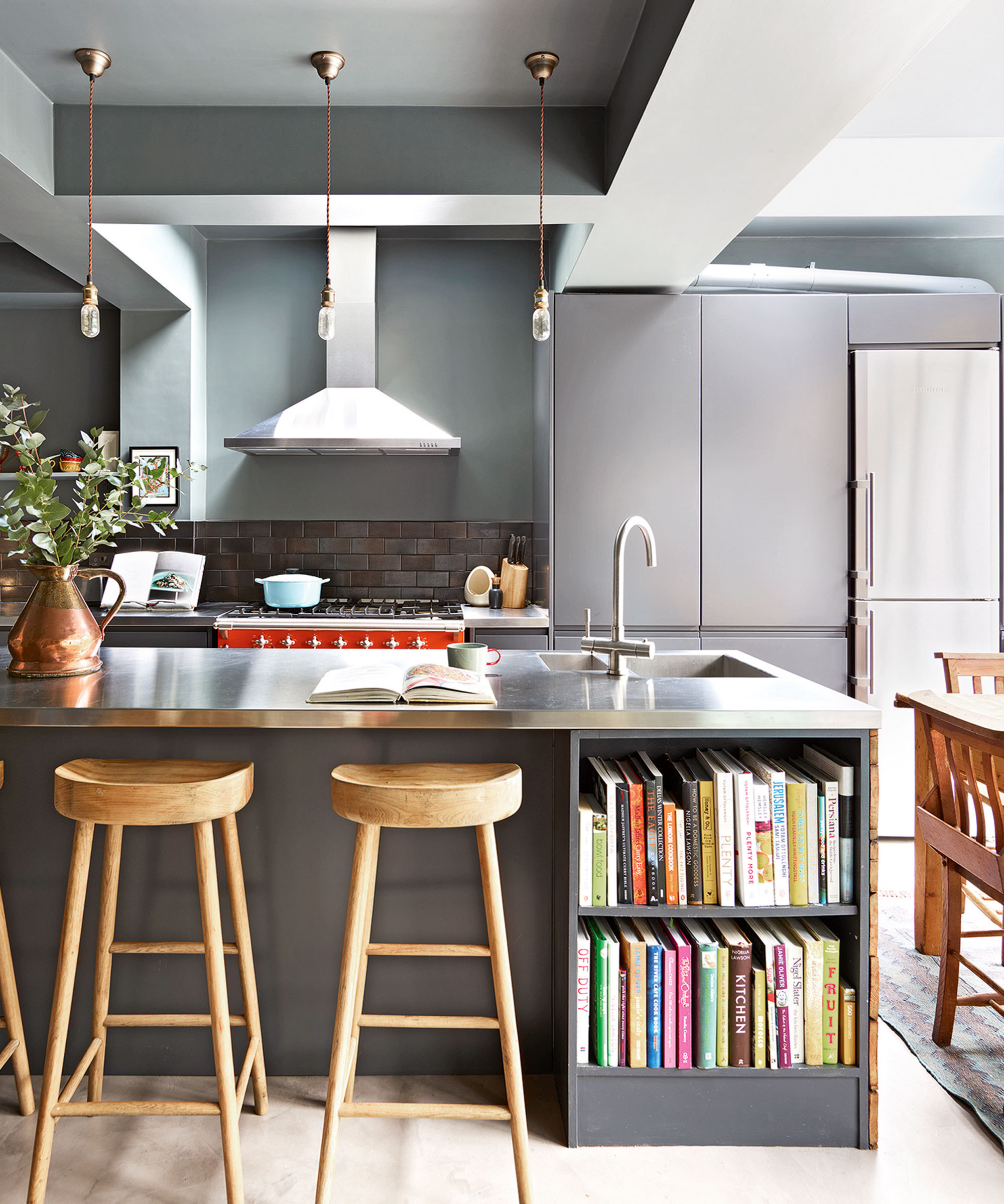
1. Work out what the problem areas are
Attempting to tackle a full kitchen all at once can be pretty daunting, so start by looking around and working out where your problem areas are. Are the countertops full of gadgets you rarely use? Are you struggling to close kitchen drawers packed with utensils, or organize a pantry overflowing with food? Work through problem areas one by one, starting with the ones that bother you most.
Don’t forget to include the decor in your kitchen ideas – having a kitchen full of fiddly little objects with no practical use is not only annoying when it comes to cleaning, but unhygienic, too!
Design expertise in your inbox – from inspiring decorating ideas and beautiful celebrity homes to practical gardening advice and shopping round-ups.
2. Donate items you don’t use
Broken or damaged items are easy, but we all struggle to part with things that we think ‘could’ be useful, but this ‘just in case’ attitude is a surefire route to a cluttered kitchen. If you can’t remember the last time you used something, it’s probably time to pass it on, regardless of how much you spent on it, or how ‘new’ it is.
‘I like to keep a donation box nearby when decluttering. It makes decision-making easier by having a place for donation items to automatically go,' says professional home organizer Toula Adu, founder of BizzyBee Organizing.
Not only is this a more eco-friendly option, but it can also make the decluttering process feel a lot less overwhelming, too.
3. Assess your appliances
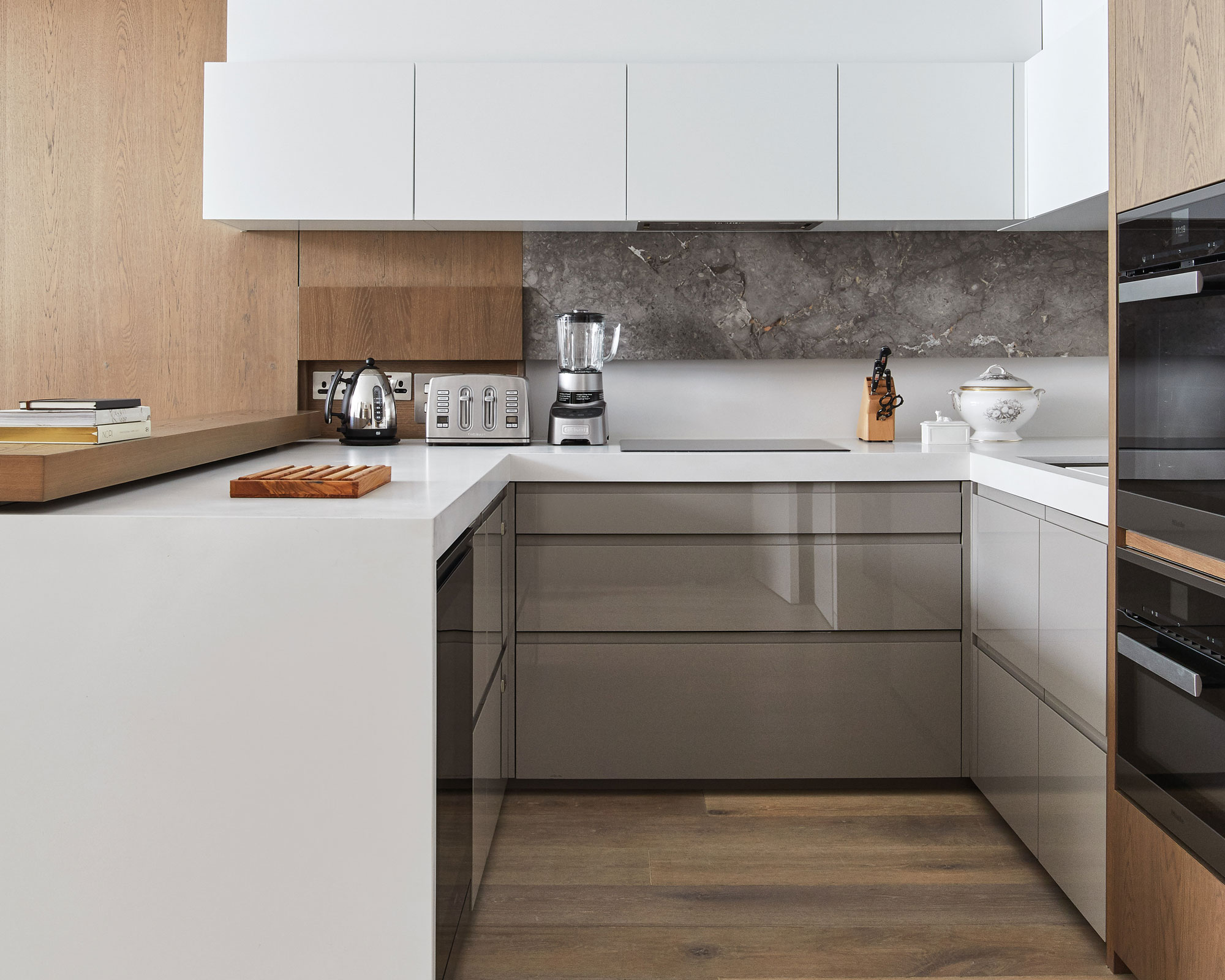
Big, bulky, and renowned space invaders, appliances actually count for a lot of the ‘stuff’ we have in our kitchens. Unless they’re ones you use daily – such as a coffee machine or juicer – they really don’t deserve to be there. Work through them all, one by one, and first consider whether they’re worth hanging on to.
‘The same goes for attachments,' says professional organizer Laura Price of The Home Organization. ‘If you don’t use the spiralizer or the ice cream maker attachment, just donate them. People are always looking for spare parts and you’ll be amazed at how much space you can create.'
4. Keep food in check
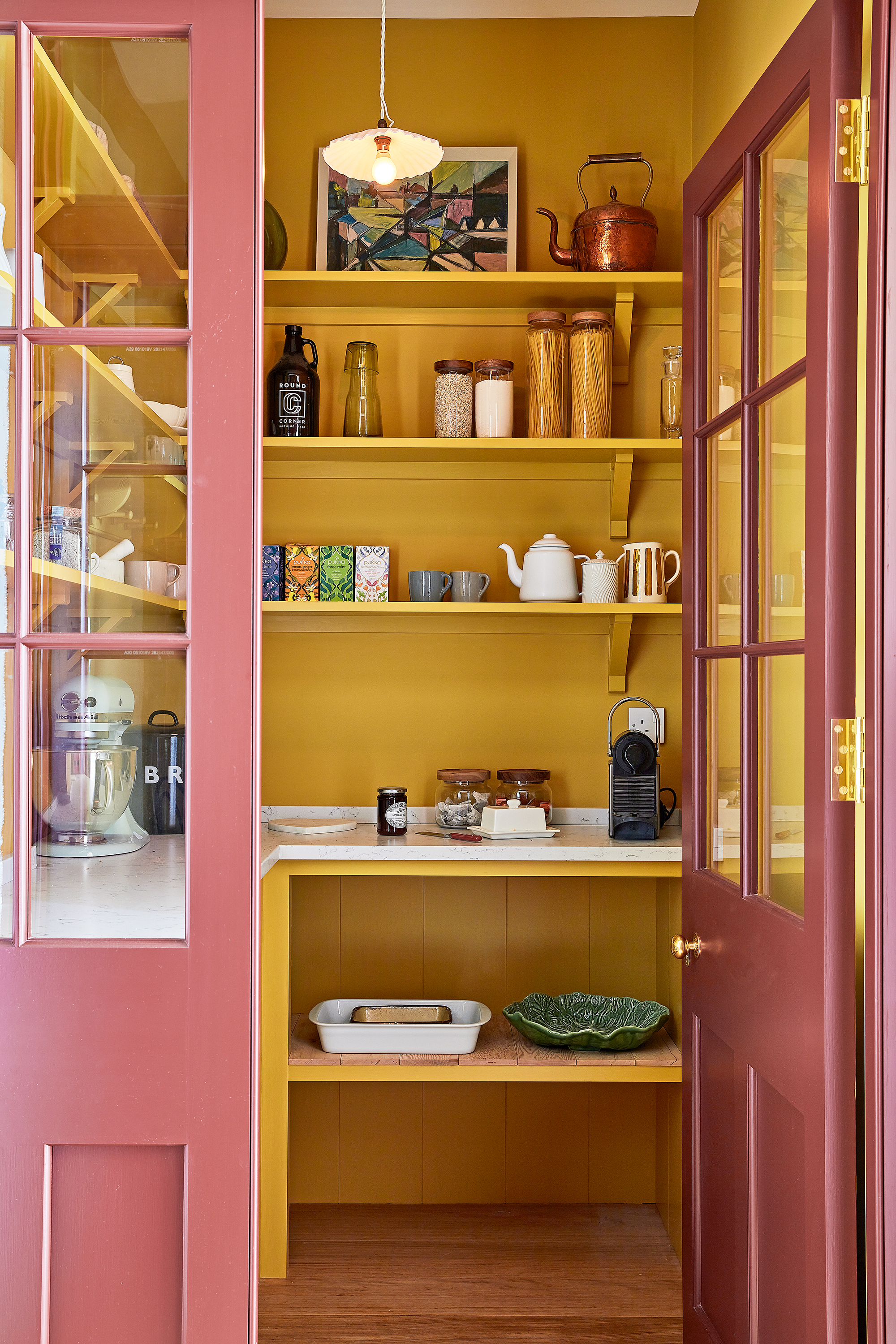
You’ll be amazed at the amount of food you’re storing in your kitchen. Often-neglected areas, such as organizing spices or deep pantry shelves are usually key culprits, but we can guarantee there are a few dodgy salad dressings, or frozen meals in your fridge freezer, too. Whether you’re organizing a small kitchen or not, food storage should be at a premium, so it’s worth taking a stock check. Now, and on a regular basis going forward, too.
‘It’s easy to clear those out-of-date items, but be honest about any foodstuffs, herbs and spices you really won’t eat. If they are in-date and unopened, donate them to a food bank, otherwise put them in the food recycling bin,' says H&G's interiors therapy and Feng Shui expert, Suzanne Roynon.

Suzanne is a Feng Shui consultant, interiors therapist and author of Welcome Home, How Stuff Makes or Breaks your Relationship – available at Amazon. She specializes in understanding the energetic impact of homes and certain possessions may have on all aspects of life, health and relationships, and the ways in which ‘stuff’ can actively prevent people and families from thriving and enjoying the lifestyle they deserve.
5. Be sensible with where you store things
Decluttering a small kitchen can be particularly tricky; if you’re working with small kitchen storage ideas, chances are you might still be left struggling for space, however thorough you are. Rather than try to cram everything into the cooking zone, consider prioritizing space only to your most frequently used items.
‘If you have "occasion-wear" that only comes out for Christmas keep it out of the way in a less accessible cupboard. If space is tight, box it safely and store elsewhere to maximize the usability of your kitchen,' says Suzanne.
6. Enlist organizational ‘helpers’ to maximize space
Perhaps it’s not the amount of ‘stuff’ in your kitchen that’s the problem, perhaps it’s how you’re storing it. Investing in the right kitchen organizers can make all the difference in kitchen storage ideas that are prone to overflow. If you’re planning a new kitchen layout, consider going bespoke when organizing kitchen drawers and cabinets, or invest in less permanent options, such as Lazy Susans, slide-out racks for organizing pots and pans, or stacked risers, like these from Amazon.
7. Steer clear of countertop clutter

Countertops attract all kinds of paraphernalia that really doesn’t need to live in your kitchen – mail, vitamins, study books and spare change… let it build, and you’re quickly going to run out of room. When it comes to organizing kitchen countertops, there are a few quick fixes that can make all the difference, but you’ll first want to get comfortable with how to declutter countertops effectively – and how to keep them that way.
8. Make use of portable storage space
If you’re sure you’re not stashing more than you need to yet you’re still short on space, it might be worth considering more flexible kitchen storage options.
‘Portable furniture is a helpful way to enjoy extra countertop or storage space as and when it’s needed. A butcher’s trolley, for example, can be brought in for busy times, such as entertaining, then moved out of the way when more floor space is required,' says George Forsyth, director of Drew Forsyth & Co. A butcher's trolley, at Wayfair can be a great way to free up space on counters and in cabinets, with multiple tiers and drawers.
9. Use baskets to categorize items
While savvy organizers are undeniably useful, the humble basket (or container) is actually your best bet for corralling items into categories – particularly if you’ve got a lot of them. Baking equipment in one, table linens in another, and so forth. Keeping related items in one place like this makes them easier to store, and easier to find, and you can move them around the kitchen as and when you need them; handy if your kitchen zones aren’t quite as defined as you might like.
10. Avoid stockpiling
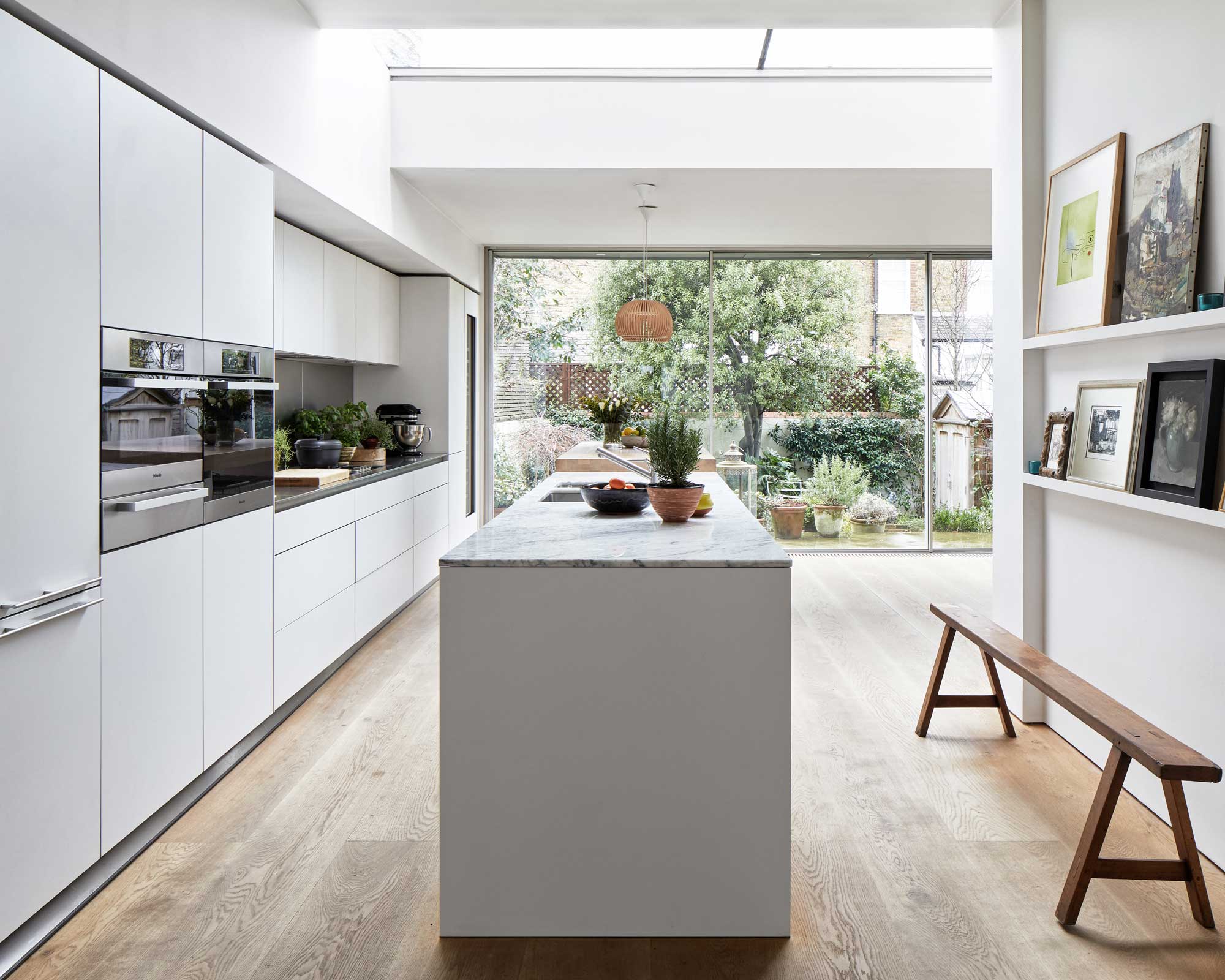
‘Use the full height of your shelves and invest in square-based, stackable canisters for pasta and flour, etc (smaller versions, like these from Amazon, are ideal for organizing spices). That way, you can see what you have, but also not waste any space. Work out how many will fit your cupboards, and always keep in mind when you’re shopping – buy more than will fit, and overspill is inevitable’, says Laura.
This minimal mindset applies to more than just food:
‘Before buying a new gadget or appliance, consider whether it's something you will use frequently enough to justify the space it will take up. Maintain your decluttered kitchen by regularly reassessing and reorganizing items as needed,' says Mary.
How do you organize a cluttered kitchen?
Well, the truth is, you don’t! A cluttered kitchen does not make for a functional one, regardless of how organized it is. The first thing you’ll need to do is streamline. Work through your kitchen, tackling one area at a time. If you’re struggling to know what to get rid of, ask yourself some questions. ‘Is this a duplicate?’, ‘Would I buy this today?’, ‘Does this make my life easier?’.
Donate, rather than throw items where you can. Keep going until you’re left with a nicely curated cookware collection. Now you’re in a perfect position to start thinking about how you want to store and organize.
So, having the confidence to declutter effectively is the first step to organizing a kitchen with too much stuff, but if you’re still finding yourself short on storage space don’t panic. As you can see, there are plenty of organizational tactics you can employ to ensure you’re maximizing form, function, and feel-good factor in your kitchen, regardless of its size!

For 10 years, Tara King worked as a Content Editor in the magazine industry, before leaving to become freelance, covering interior design, wellbeing, craft and homemaking. As well as writing for Ideal Home, Style at Home, Country Homes & Interiors, Tara’s keen eye for styling combined with a passion for creating a happy – and functional – family home has led to a series of organization and cleaning features for H&G.
